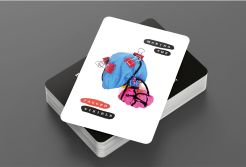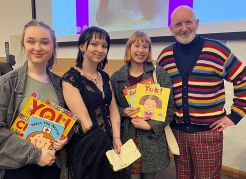27 September 2002
The Sports Pages: a last bastion of Little England?
Linguists find parallels across Europe
ENGLISH football is perpetuating myths about the black male - or at least the people who write about it are.
A study of hundreds of press reports by linguists at Manchester Metropolitan University found that words expressing build and physical power were much more commonly used to describe black footballers than white.
Blacks, who make up 30-35% of professionals, are also associated with laid back, happy-go-lucky approach to the game and are more likely, by virtue of their 'unpredictable temperament', goes the image, to be fierce and aggressive.*
Researcher David Hand said: "The stereotype forever associating blacks with the body is often brought into sharper focus by media sports texts' insistence on contrasting black footballers' physical attributes with their implicitly superior white colleagues' disciplined intellectual capacities.
"Quite simply, in English football as mediated even by the 'quality' daily press, blacks provide the brawn, whites the brain."
Foreigners
Negative traits are also assigned to foreigners, who are still described invariably as 'white-booted fairies' (The Times, June 25, 1998) with a weak 'theatrical temperament' (The Times, Oct 6, 1998).
Importantly, the study of texts from 1996-2000 found the qualities were as ready to stereotype as their downmarket cousins.
Groups, it said, whether they are geographically based - Yorkshire, Liverpool, or ethnically-defined - are reduced to a limited set of purportedly typical characteristics, largely rooted in traditional cultural perceptions.
David Hand said: "Although the language might be less blunt than in the 1970s, the images remain the same and fail to take account of the evolving dynamism and diversity of England as it moved into the 21st century.
"Football writing in the Times and other newspapers still portrays the north of England as a remote, rough and ready region, populated by humorous, hospitable and hard-working people."
Europe
David and co-author Liz Crolley studied hundreds of press articles covering the Premiership, Euro 96, Euro 2000 and compared them with French and Spanish sports reporting.
They found many ready parallels, with papers like Le Monde and El Pais as disposed as their English counterparts to describe the Germans as efficient and machine-like.
The image of English football as passionate, energetic and committed but lacking in creative flair is the one most strongly propagated by the Press in those countries.
They concluded: "Football journalism can be seen as the last bastion where simplistic views on a nation's identity can be aired. At times, it can be taken as tongue-in-cheek, but this sometimes can cut no ice.**"
They found no evidence of European identities on the wane, despite the globalisation of football and moves towards a 'European Superstate'.
"The sports pages provide a backdrop for the strong collective identity of communities, regions and nations."
ends
*words associated with blacks are bulk/bulky, loose-limbed, force, power, physique.
**The Press Complaints Commission refused to accept the tongue-in-cheek defence from the Daily Mirror after a front page 'Achtung Surrender' (June 24, 1996) caused controversy during Euro 96.
Football, Europe and the Press by David Hand and Liz Crolley is published by Frank Cass ISSN 1368 9789.
David Hand, Dept of Languages, Manchester Metropolitan University 0161 247 3935


